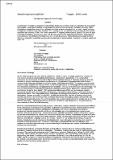| dc.description.abstract | In recent years, changes in participatory methodologies (PMs) may have been even more rapid than those in spatial
technologies. Local people's abilities to make maps only became widely known and facilitated in the early 1990s.
Participatory mapping has spread like a pandemic with many variants and applications not only in natural resource
management but also in many other domains. With mapping as one element, there are now signs of a new pluralist
eclecticism and creativity in PMs. The medium and means of mapping, whether ground, paper or GIS, and the style
and mode of facilitation, influence who takes part, the nature of outcomes and power relationships. Much depends
on the behaviour and attitudes of facilitators and who controls the process. Many ethical issues present troubling
dilemmas, and lead to overarching questions about empowerment and ownership. Questions to be asked, again and
again, are:
Who is empowered and who disempowered?
and
Who gains and who loses? | en_GB |

